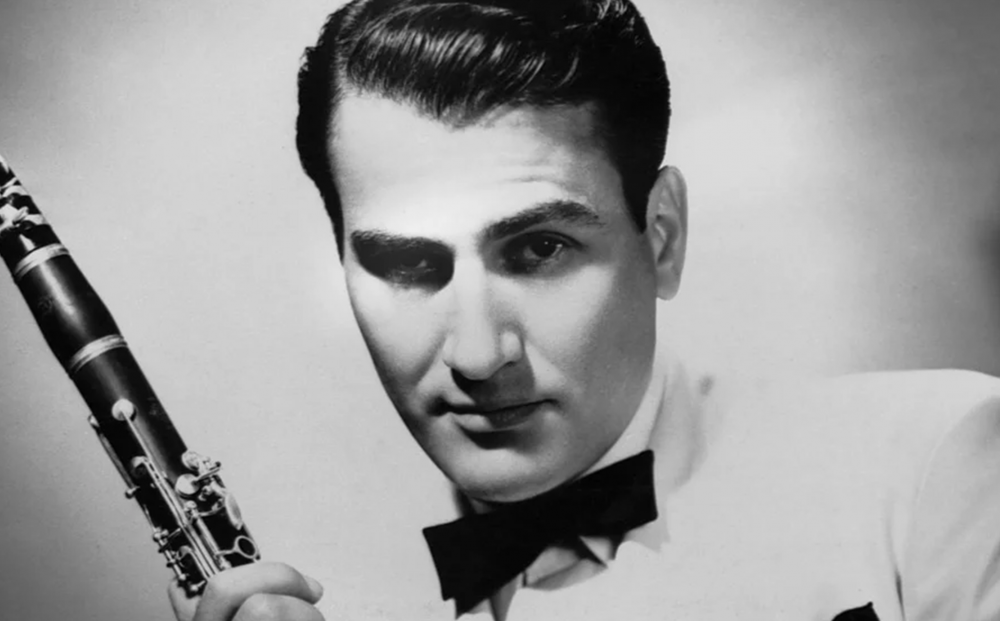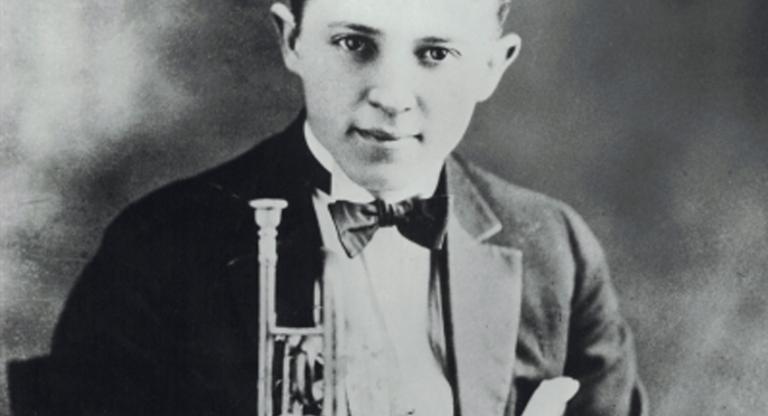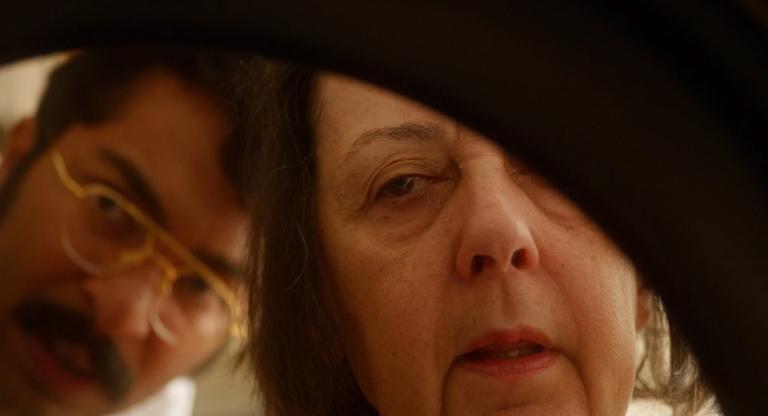Every bandleader of the Swing Era had his theme song: Tommy Dorsey’s was “I’m Getting Sentimental Over You,” Benny Goodman’s was “Let’s Dance” (and, in death, became “Sing, Sing, Sing (with a Swing)” thanks to the inescapable Chips Ahoy! commercials of the 1990s), while of course Glenn Miller will be forever linked with “In The Mood”. But Artie Shaw chose one of his own compositions as entrance music, a curiously macabre number called “Nightmare” in which Shaw’s signature alto clarinet wails atop string and horn sections delivering a slow-mounting dirge, possibly cribbed from the opening notes of Chopin’s “Funeral March.” Near the end of her documentary Artie Shaw: Time is All You’ve Got (1985), filmmaker Brigitte Berman drops “Nightmare” as a framing device for a scene of the cantankerous bandleader (born Arthur Arshawsky, in the Lower East Side) being feted by his contemporaries in a concert hall. Since the song is the opposite of triumphal, this leitmotif provokes an uncomfortable question: Whose nightmare are we occupying? Shaw’s? Or is Shaw himself the nightmare?
Shaw and Berman met when she interviewed him for her prior, equally essential documentary Bix: Ain’t None of Them Play Like Him Yet (1981). There, Berman aimed to set the record straight about the preternaturally gifted yet tortured cornet player Bix Beiderbecke, who died at the age of 28 during the Depression. Berman had been inspired by the dearth of available archival footage of Bix, and hearsay around his death. Time is All You’ve Got functions as a kind of inverse, because Shaw is front and center, alive and well; it’s impossible to imagine the film existing without his multiple-days-long interview. Watching this material, one gets the slow-simmered feeling that Artie Shaw’s peculiar mix of self-aggrandizement and self-deprecation may be masking an obsessive, if not pathological, need to control the narrative. This is what makes Berman’s film so unique: it’s a genteel portrait documentary at first blush, but eventually becomes a murkier meditation on the collision of artistry and capital, an X-ray of a one-of-a-kind artist’s unresolved existential dilemma.
It’s startling to realize that music was a mere means to an end for Shaw, who says he wanted to be onstage with the “pretty girls and bright lights”. Raised in poverty by immigrant parents, he describes himself as having been “like any young American kid, seeking more, more, and more. I wanted more of everything.” Mere minutes into Berman’s documentary it’s the late ’30s and he is the hottest clarinetist in New York City—with the attendant tours, radio appearances, record and movie deals, sportscars, Patek Philippes, and groupies that lifestyle entailed. But after almost two decades of break-ups, reconfigured bands, for-hire gigs, and false restarts, Shaw walked away from showbiz entirely in 1954, still at the peak of his powers. He wanted fame but hated celebrity; he was disillusioned by jitterbug culture and disdained the intelligence of his fans, more often than not refusing to sign autographs.
Shaw was anxious to be seen not as just another entertainer but as a serious artist, a sophisticate. So if the film’s first half is relatively straight biography, the second is given over to this lifelong, unresolved quest for some new summit of accomplishment, forever just out of reach. Later-life obsessions included fly-fishing, astronomy, psychoanalysis, aviation, and literature (including a never-completed, epic work of autofiction about a brilliant bandleader named “Albie Snow”).
Over the course of Berman’s masterful series of interviews with Shaw and his contemporaries, one begins to slowly realize the clarinetist’s mind was not just omnivorous but obsessive—or, in the words of his ex-wife Evelyn Keyes (the last of Shaw’s eight failed marriages), “exacting”. Tyrannical? Filmed just months after their divorce was finalized, Keyes’s interview sees the actress traumatized by Shaw’s domineering nature while simultaneously pointing to his brilliance to rationalize her own suffering.
Time is All You’ve Got was never released on home video, and has been unavailable to see for over 35 years outside of the rare museum screening. After years of investing her own money in completing the film, Berman was sued by Shaw, who claimed he was owed royalties on the film and the use of his music therein. We’re all lucky that the film has been restored from the original negative, and New Yorkers even moreso for this weekend’s opportunities to see Berman talk about it at Film Forum.
Shaw departed this world on December 30, 2004, at the age of 94; his estranged son Jonathan (one of two, neither of whom he mentions in the film) told the New York Times that his father died “alone and miserable, as he chose to do.” That same week saw the release of Martin Scorsese’s epic Howard Hughes biopic, The Aviator. You may recall the scene in which Leonardo DiCaprio’s Hughes, heartbroken over the implosion of his relationship with Katharine Hepburn and wracked with OCD, disrobes entirely, puts his clothes in a pile, and sets that pile aflame, then stares into the licks of fire against the demonic strains of “Nightmare.” This double entendre is classic Scorsese: later in the film, Hughes’s on-and-off paramour Ava Gardner will taunt him with news that she’s been having an affair with Shaw, whose controlling approach to women—alongside everything and everyone else—confirms he had more in common with Hughes than either man probably would have liked to admit. Against this era’s constant churn of biopics fetishizing male genius gone too far, Berman’s documentary stands out because it puts a face to the real thing: it’s a chilling portrait of the artist as a megalomaniac, an icon of high Modernism trapped in the labyrinth of his own insecurity.
Artie Shaw: Time Is All You’ve Got runs through January 11 at Film Forum, the U.S. theatrical premiere of a new digital restoration. Discussions with director Brigitte Berman will follow this afternoon’s and tomorrow’s screenings, January 7 and 8.




